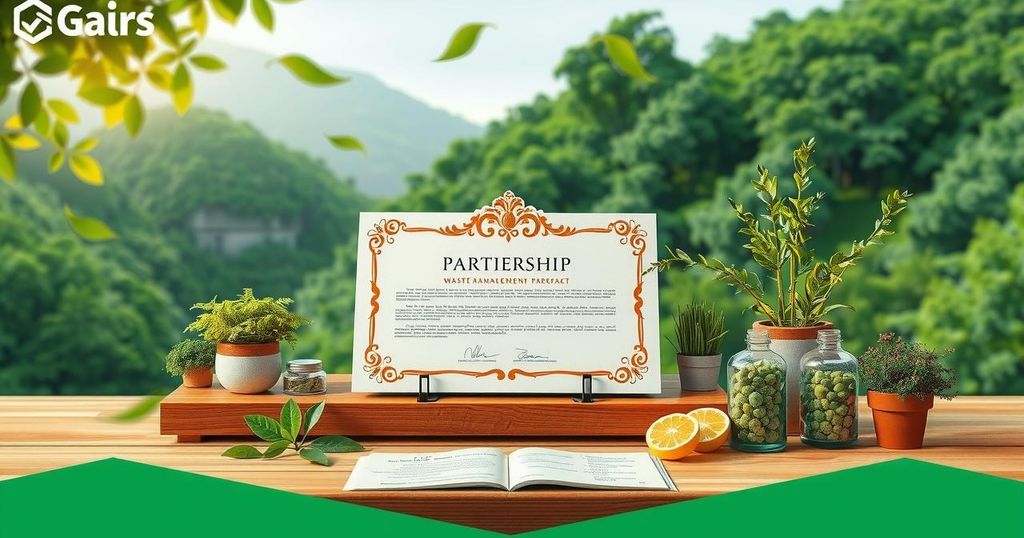The Gambia Partners with Jospong Group for Innovative Waste Management Solutions

The Gambia has signed an MoU with the Jospong Group to implement tailored waste management solutions. The initiative, championed by Minister Rohey John Manjang, aims to create a waste treatment plant in six months under a Public Private Partnership. This partnership emphasizes self-sufficiency and innovation in addressing local challenges, fostering cooperation and development between The Gambia and Ghana.
The Gambia has formalized a partnership with the Jospong Group of Companies (JGC) by signing a Memorandum of Understanding (MoU) to implement tailored waste management solutions. This initiative is viewed as an “African solution to an African challenge.” The agreement was signed by Minister of Environment, Climate Change and Natural Resources, Rohey John Manjang, and Joseph Siaw Agyepong, Executive Chairman of JGC, during a ceremony in Accra on March 3, 2025.
Minister Manjang expressed the necessity for Africa to create self-sufficient solutions to its challenges and announced her goal of establishing a waste treatment plant in The Gambia via a Public Private Partnership (PPP) within six months. She emphasized that innovation is critical for progress despite limited resources. “For Africa to go forward with our limited resources, we need to be innovative in making sure that we fix our problems,” she stated.
This collaboration follows a five-day tour of JGC’s waste management facilities by a Gambian delegation, including government officials and environmental experts. Manjang highlighted that private sector cooperation is essential for effective solutions: “Governments cannot do things alone and must bring the private sector on board.”
The MoU marks the commencement of a detailed plan for implementing a comprehensive waste management strategy in The Gambia. Manjang articulated her confidence in the project’s success and her enthusiasm for JGC’s innovative methods, reflecting a belief in collaborative African solutions to prevailing challenges. She noted, “It is doable, it is workable, it is achievable, and we can do it in The Gambia.”
Mr. Siaw Agyepong linked the growth of JGC to a higher purpose and shared insights from discussions with The Gambia’s Vice President that led to the MoU. He remarked, “When ideas marry strategy, the product is money, so money is the son of strategy and ideas.” He underscored Africa’s need for self-initiated development rather than dependency on foreign aid, referencing successful nations like Rwanda.
Before signing the MoU, Minister Manjang and the Gambian delegation visited Ghana’s Minister of Environment, Science, Technology, and Innovation, Ibrahim Murtala Muhammed, to strengthen bilateral ties. Murtala emphasized the importance of protecting Ghanaian investors in The Gambia, citing the historical connection that enhances cooperation between the two countries.
The Gambia shares a history with Ghana rooted in their mutual fight for independence, and Murtala expressed a desire for investor security to attract further investments. He called upon JGC to uphold corporate responsibility while advancing its operations in The Gambia, ensuring that their initiative reflects positively on Ghana’s image.
During their visit, the Gambian delegation inspected JGC’s facilities, including composting and recycling plants. Manjang noted the similarities between the challenges faced by Ghana and The Gambia, asserting that collaboration could yield effective environmental solutions: “We have a lot in common with Ghana, and we believe that by working together, we can find solutions to our environmental challenges.”
The Gambian delegation also acknowledged the need for environmentally sustainable waste management practices as population growth leads to increased environmental concerns. The tour of JGC’s installations aimed to emphasize the importance of adopting progressive waste management strategies for ecological sustainability.
In conclusion, the signing of the MoU between The Gambia and the Jospong Group signifies a strategic step towards addressing waste management challenges through localized solutions. The commitment shown by both parties showcases the potential for innovation and collaboration to overcome environmental obstacles. Furthermore, the dialogue between Gambian and Ghanaian leaders emphasizes the importance of protecting investor interests and fostering regional cooperation for sustainable development in Africa.
Original Source: 3news.com





